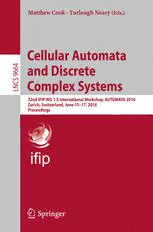Table Of ContentMatthew Cook · Turlough Neary (Eds.)
Cellular Automata
4 and Discrete
6
6
9
S
Complex Systems
C
N
L
22nd IFIP WG 1.5 International Workshop, AUTOMATA 2016
Zurich, Switzerland, June 15–17, 2016
Proceedings
123
Lecture Notes in Computer Science 9664
Commenced Publication in 1973
Founding and Former Series Editors:
Gerhard Goos, Juris Hartmanis, and Jan van Leeuwen
Editorial Board
David Hutchison
Lancaster University, Lancaster, UK
Takeo Kanade
Carnegie Mellon University, Pittsburgh, PA, USA
Josef Kittler
University of Surrey, Guildford, UK
Jon M. Kleinberg
Cornell University, Ithaca, NY, USA
Friedemann Mattern
ETH Zurich, Zürich, Switzerland
John C. Mitchell
Stanford University, Stanford, CA, USA
Moni Naor
Weizmann Institute of Science, Rehovot, Israel
C. Pandu Rangan
Indian Institute of Technology, Madras, India
Bernhard Steffen
TU Dortmund University, Dortmund, Germany
Demetri Terzopoulos
University of California, Los Angeles, CA, USA
Doug Tygar
University of California, Berkeley, CA, USA
Gerhard Weikum
Max Planck Institute for Informatics, Saarbrücken, Germany
More information about this series at http://www.springer.com/series/7407
Matthew Cook Turlough Neary (Eds.)
(cid:129)
Cellular Automata
and Discrete
Complex Systems
22nd IFIP WG 1.5 International Workshop, AUTOMATA 2016
Zurich, Switzerland, June 15–17, 2016
Proceedings
123
Editors
MatthewCook TurloughNeary
University of Zurich University of Zurich
Zurich Zurich
Switzerland Switzerland
ISSN 0302-9743 ISSN 1611-3349 (electronic)
Lecture Notesin Computer Science
ISBN 978-3-319-39299-8 ISBN978-3-319-39300-1 (eBook)
DOI 10.1007/978-3-319-39300-1
LibraryofCongressControlNumber:2016939364
LNCSSublibrary:SL1–TheoreticalComputerScienceandGeneralIssues
©IFIPInternationalFederationforInformationProcessing2016
Thisworkissubjecttocopyright.AllrightsarereservedbythePublisher,whetherthewholeorpartofthe
material is concerned, specifically the rights of translation, reprinting, reuse of illustrations, recitation,
broadcasting, reproduction on microfilms or in any other physical way, and transmission or information
storageandretrieval,electronicadaptation,computersoftware,orbysimilarordissimilarmethodologynow
knownorhereafterdeveloped.
Theuseofgeneraldescriptivenames,registerednames,trademarks,servicemarks,etc.inthispublication
doesnotimply,evenintheabsenceofaspecificstatement,thatsuchnamesareexemptfromtherelevant
protectivelawsandregulationsandthereforefreeforgeneraluse.
Thepublisher,theauthorsandtheeditorsaresafetoassumethattheadviceandinformationinthisbookare
believedtobetrueandaccurateatthedateofpublication.Neitherthepublishernortheauthorsortheeditors
give a warranty, express or implied, with respect to the material contained herein or for any errors or
omissionsthatmayhavebeenmade.
Printedonacid-freepaper
ThisSpringerimprintispublishedbySpringerNature
TheregisteredcompanyisSpringerInternationalPublishingAGSwitzerland
Preface
This volume contains the papers presented at the 22nd International Workshop on
Cellular Automata and Discrete Complex Systems, AUTOMATA 2016. The confer-
ence was held at the University of Zurich, Switzerland, June 15–17, 2015. AUTO-
MATA 2016 was an IFIP event of IFIP Working Group 1.5.
The AUTOMATA series began in Dagstuhl, Germany, in 1995 and has since been
runyearly,appearinginEurope,NorthandSouthAmerica,andAsia.Aswithprevious
editions of the series, AUTOMATA 2016 provided a focal point for researchers
interested in cellular automata and related discrete complex systems where they could
exchange ideas,presenttheirlatestresearch,andforgenewcollaborativepartnerships.
The AUTOMATA series is concerned with research on all fundamental aspects of
cellular automata and related discrete complex systems. Topics of interest include:
dynamics, topological, ergodic and algebraic aspects, algorithmic and complexity
issues, emergent properties, formal language processing, symbolic dynamics, models
of parallelism and distributed systems, timing schemes, phenomenological descrip-
tions, scientific modeling, and practical applications.
We would like to express our appreciation to the invited speakers, Klaus Sutner,
GuillaumeTheyssier,TommasoToffoli,andAndrewWinslow.Wealsothankthemfor
their contributions to this volume.
We thank all the authors who submitted to AUTOMATA 2016. There were 23
submissions in total. Each paper was assigned to three members of the Program
Committee and followinga complete reviewing process andsubsequent discussion by
the committee 12 papers were accepted for publication in these proceedings. In addi-
tion, there were a number of exploratory papers presented at the conference and we
would like to take this opportunity to thank those who submitted to the exploratory
track.
We thank the Program Committee for their diligent work, and the reviewers who
assistedintheevaluationofpapers.WewouldliketothanktheAUTOMATASteering
Committee for giving us the opportunity to host AUTOMATA 2016 at the University
ofZurichandfortheirinvaluableadviceandsupportwithaspecialthankyoutoJarkko
KariandPedrodeOliveira.WearegratefultotheLectureNotesinComputerScience
team of Springer for all their help in preparing this volume. Finally, we would like to
thankiniForumandtheadministrativestaffattheInstituteofNeuroinformaticsfortheir
help in organizing this event, in particular Kathrin Aguilar Ruiz-Hofacker, Maik
Berchten, David Lawrence, and Simone Schumacher, who were always ready to
provide advice and assistance.
April 2016 Turlough Neary
Matthew Cook
Organization
Program Committee
Matthew Cook University of Zurich and ETH Zurich, Switzerland
Pedro de Oliveira Universidade Presbiteriana Mackenzie, Brazil
Nazim Fatès Inria Nancy Grand Est, France
Paola Flocchini University of Ottawa, Canada
Enrico Formenti Université Nice Sophia Antipolis, France
Anahí Gajardo University of Concepción, Chile
Eric Goles Adolfo Ibáñez University, Chile
Jarkko Kari University of Turku, Finland
Martin Kutrib Universität Giessen, Germany
Andreas Malcher Universität Giessen, Germany
Genaro Martínez University of the West of England, UK
Kenichi Morita Hiroshima University, Japan
Turlough Neary University of Zurich and ETH Zurich, Switzerland
Nicolas Ollinger Université d’Orléans, France
Matthew Patitz University of Arkansas, USA
Ivan Rapaport Universidad de Chile, Chile
Hiroshi Umeo Osaka Electro-Communication University, Japan
Damien Woods California Institute of Technology, USA
Thomas Worsch Karlsruhe Institute of Technology, Germany
Additional Reviewers
Silvio Capobianco Pablo Saez
Jacob Hendricks Georgios Ch. Sirakoulis
Rolf Hoffmann Michal Szabados
Markus Holzer Rodrigo Torres
Gaétan Richard Matthias Wendlandt
Trent Rogers Andrew Winslow
Organizing Committee
Matthew Cook University of Zurich and ETH Zurich, Switzerland
Turlough Neary University of Zurich and ETH Zurich, Switzerland
VIII Organization
Steering Committee
Pedro de Oliveira Universidade Presbiteriana Mackenzie, Brazil
Teijiro Isokawa University of Hyogo, Japan
Jarkko Kari University of Turku, Finland
Andreas Malcher Universität Giessen, Germany
Thomas Worsch Karlsruhe Institute of Technology, Germany
Sponsoring Institutions
Institute of Neuroinformatics, University of Zurich
University of Zurich
Invited Talk Abstracts
Automata, Semigroups and Dynamical Systems
Klaus Sutner
Carnegie MellonUniversity
Pittsburgh, PA 15213,USA
Abstract. Invertible transducers are Mealy automata that determine injective
maps on Cantor space and afford compact descriptions of their associated
transductionsemigroupsandgroups.Alotofinformationhasbeenunearthedin
the last two decades about algebraic aspects of these machines, but relatively
little is known about their automata-theoretic properties and the numerous
computationalproblemsassociated withthem.Forexample,itisquitedifficult
to pin down the computational complexity of the orbits of maps defined by
invertible transducers. We study some of these properties in the context of so-
called m-lattices, where the corresponding transduction semigroup is a free
Abeliangroupoffiniterank.Inparticularweshowthatitisdecidablewhether
aninvertible transducer belongs to thisclass.

